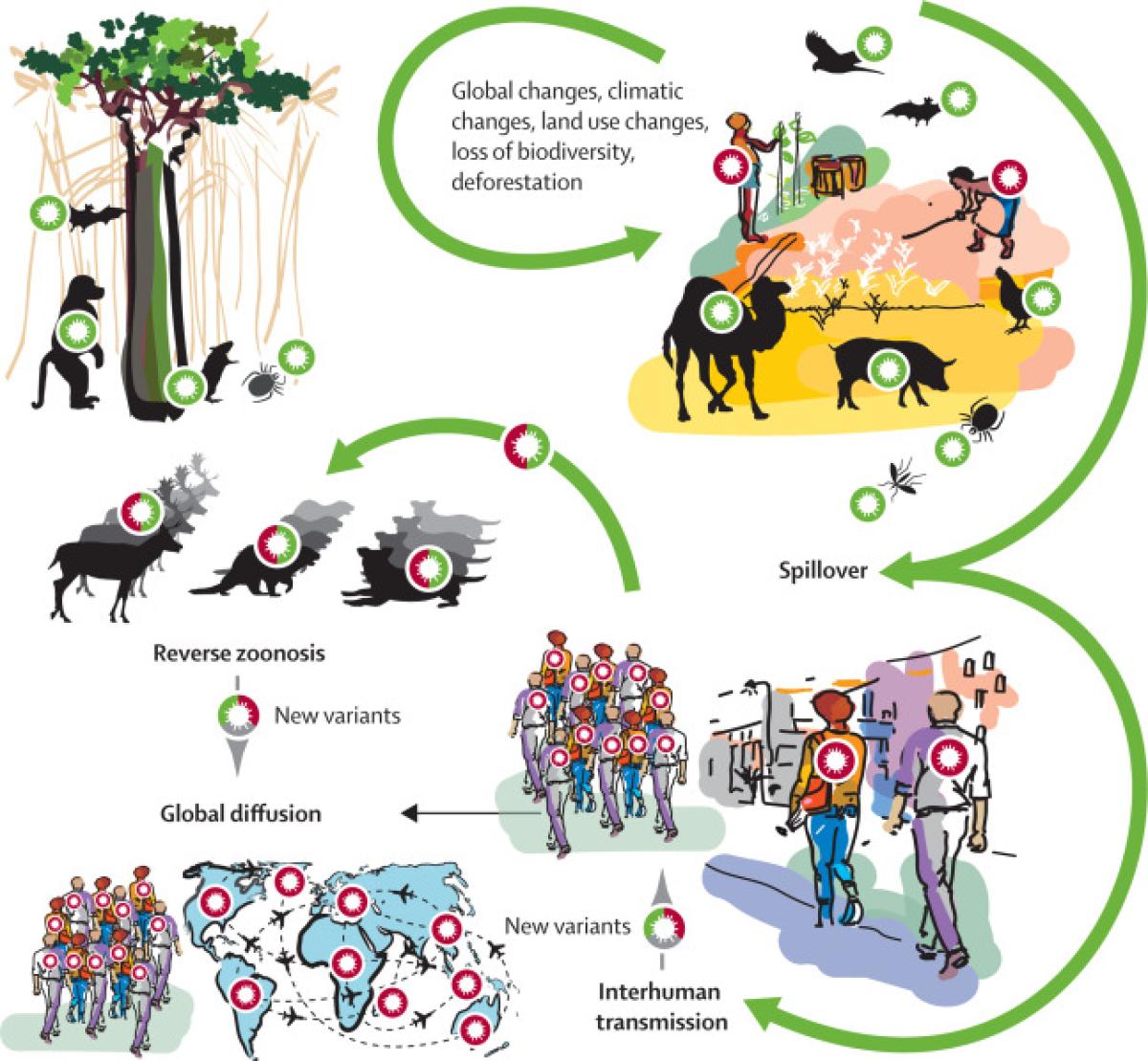Publication of the French Scientific Council on Covid-19 in the journal The Lancet on October 24, 2022. CIRAD press release on October 26, 2022.
Effective future health operations and policy will rely on encompassing the interconnections between human, animal and ecosystem health. This is the decisive conclusion reached by the French Scientific Council on Covid-19, which includes Bruno Lina, University Professor and hospital practitioner (HCL/CIRI, VirPath team). They published a roadmap in The Lancet for the practical application of so-called “One Health” approaches.
Like 75% of emerging diseases, Covid-19 is probably a zoonosis, in other words a disease passed from animals to humans. To counter this type of health risk, scientists have been working for years on One Health approaches, based on the interconnections and equilibria between human, animal and ecosystem health.
In a recent article in The Lancet, the French Scientific Council members set out the operations required to make such One Health approaches a reality at every stage of pandemic crises.
Long-term international ambitions and national strategies
“More than just a concept, One Health is a strategy long used in research and surveillance in numerous zoonosis projects”, the authors stress. The United Nations has recognized that strategy, with the creation in May 2021 of the One Health High Level Expert Panel (OHHLEP).
The article’s authors feel that despite this international recognition, political action and practice are continuing to lag behind, notably on a national level. Sharing of epidemiological data currently relies on short-lived regional programmes largely concentrated in the global North. Those programmes are far from effective, and could usefully be replaced by long-term research projects and initiatives covered by national plans worldwide. On a national level, the challenge is to truly link and strengthen collaborative operations and projects involving different organizations (national and regional bodies, research organizations, reference laboratories, hospitals, etc) working on human, animal and environmental health.
These ambitious strategies call for major investment and effective exchanges between the local, national and international levels.
Resilient, appropriate lifestyles: the role of agriculture
In addition to monitoring systems on various scales, the scientists recommend taking steps to prevent the emergence of epidemics. The agricultural sector is vitally important, because of its close links with ecosystem health, biodiversity, and animal and human food supplies.
CIRAD’s Thierry Lefrançois, the article’s lead author, trained as a veterinarian and now specializes in One Health networks and approaches. He was a member of the French Scientific Council on Covid-19 until it was dissolved in late July 2022 as a result of the end of the national state of emergency. He believes that the links between biodiversity, agriculture, food and health also encompass another major element: climate change. “Several One Health studies have demonstrated the links between climate change, biodiversity crises and emerging zoonotic diseases”, he points out. “In view of the health risks, we have no other choice but to tackle the health, climate and biodiversity crises simultaneously. In particular, this will call for a rapprochement between the Conferences of the Parties – COP on climate and COP on biodiversity – and between those COPs and the international organizations working on One Health (WHO, OIE, FAO, UNEP).”
Bruno Lina, the article’s last author, a virologist who heads the national reference centre for viral respiratory diseases at the Hospices Civils de Lyon and a researcher at the Centre International de Recherche en Infectiologie in Lyon*, stresses that “an integrated, intersectoral approach with long-term support from public policymakers is the only way of combatting health risks effectively, by implementing measures to prevent and control emergence and structuring the response to crises”.
The French Committee for the Monitoring and Anticipation of Health Risks (COVARS), which replaced the Scientific Council specifically devoted to the Covid crisis, will be resolutely adopting a One Health approach, considering all the health risks associated with infectious agents that affect humans and animals, with environmental and food pollutants, and with climate change. Its recent creation confirmed the French government’s determination to decompartmentalize animal, human and environmental health. Three of this publication’s co-authors (Thierry Lefrançois, Bruno Lina et Denis Malvy) are members of the Committee, which is chaired by Brigitte Autran.
* Virpath team (University of Lyon, INSERM, U1111, UCBL, CNRS, UMR5308, ENS de Lyon)

Figure: © The Lancet
Reference: After two years of pandemic, translating One Health into action is urgent. Thierry Lefrançois, Denis Malvy, Laetitia Atlani-Duault, Daniel Benamouzig, Pierre-Louis Druais, Yazdan Yazdanpanah, Jean-François Delfraissy, Bruno Lina. The Lancet. October 24, 2022.
DOI : 10.1016/S0140-6736(22)01840-2





